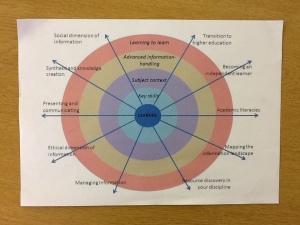You can watch the video recording of this presentation here.
This was a slightly tongue-in-cheek presentation themed around applying the Gartner Hype Cycle to the various phases of delivering a discovery service, based on experiences at Huddersfield and from discussions with numerous librarians over the last 3 years.
Technology Trigger
The federated search product we had at Huddersfield was failing to meet the needs of our users and was widely disliked for being slow, clunky and unreliable. Increasingly we were seeing traffic to library e-resources being driven from Google Scholar and, anecdotally, students were telling us that their lecturers were advising them to use Google Scholar as the library provided service were too difficult to use. Although we could point to growing evidence that Scholar was an imperfect solution (e.g. partial or unknown coverage of resources), the reality was we simply couldn’t compete on ease of use.
We knew we’d have to make a radical change to improve the situation…
Peak of Inflated Expectations
As we started to look around for ways of improving e-resource provision, we saw an early version of Summon during March/April 2009 and it convinced us that we could potentially deliver a Scholar-like experience for our users. After going out to tender, we selected Summon and began implementation during late 2009.
I should point out here that I’m not implying Summon is a hyped product, but simply that our expectations are often set a little too high (“yay, shiny new toy!”).
Trough of Disillusionment
Matt Borg explored this topic during his session, but one of the issues around implementing Summon is the need to understand that it was designed from day one as a tool to support the information seeking behaviours of students and researchers. To paraphrase a comment Matt made at the 2012 MmIT Conference…
The trouble with Summon is that students don’t need to be taught how to use it, but librarians do
That isn’t an easy pill to swallow and I suspect is one of the reasons why some libraries choose to implement alternative discovery service products that behave more like a traditional library database.
During the “disillusionment” phase, it’s common to become fixated on issues such as:
- title coverage of specific journal platforms and concerns over missing content — the “EBSCO problem” was an topic raised in both of the afternoon breakout sessions and the issue isn’t specific to just Summon (see Orbis Cascade Alliance)
- a desire to apply familiar advanced searching techniques, as used with other databases, to Summon
- the realisation that students will still need to be taught how to use the native interfaces of certain subject specific databases
- OpenURL is an imperfect linking solution, so article level linking to a small number of journal platforms can be hit and miss
- if you haven’t previously implemented a next generation OPAC, it’s likely that errors in cataloguing will be exposed for the first time
The end result is that it’s common for libraries to take a cautious approach to launching their discovery product. At Huddersfield, we launched Summon as a “beta” service in January 2010 and ran it in parallel with Metalib until July 2010.
Slope of Enlightenment / Plateau of Productivity
For me, this is what the two #SummonIL events have been about — an opportunity to share best practice and to discuss how Summon has altered the approach to teaching. The common refrain from presenters at both events is that Summon frees up time to concentrate on the delivery of information literacy.
